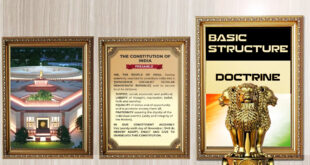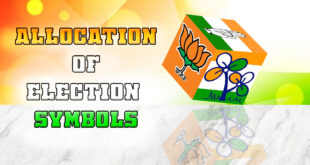The Election Commission (EC) has made the process of allotting airtime to political parties for campaigning on Akashvani and Doordarshan entirely online.
Instead of collecting physical vouchers for airtime, the parties will henceforth be issued digital time vouchers through an Information Technology (IT) platform. “This step reflects the commission’s commitment to leveraging technology for the betterment of the electoral process and ease of all stakeholders,”
The Election Commission (EC)
The Election Commission of India (ECI) is a constitutional body established by the Constitution of India to conduct and regulate elections in the country. Article 324 of the Constitution provides that the power of superintendence, direction, and control of elections to parliament, state legislatures, the office of the president of India, and the office of vice- president of India shall be vested in the election commission. Thus, the Election Commission is an all-India body in the sense that it is common to both the Central government and the state governments.
The ECI is headed by the Chief Election Commissioner (CEC), who is assisted by two Election Commissioners. The CEC and the Election Commissioners are appointed by the President of India, but they are not removable by the President. The ECI has its headquarters in New Delhi, and it has regional offices in all the states and union territories of India.
The ECI is responsible for the following:
- Conducting elections to parliament, state legislatures, and the offices of the president and vice-president of
- Regulating the electoral process, including the preparation of electoral rolls, the conduct of elections, and the counting of
- Ensuring free and fair elections.
- Providing voter
- Resolving election-related
The ECI has been widely praised for its role in conducting free and fair elections in India. The ECI has been credited with helping to consolidate democracy in India and with making the electoral process more transparent and accountable.
Here are some of the key achievements of the ECI:
- The introduction of the electronic voting machine (EVM) in 1995. The EVM has helped to make elections more efficient and
- The introduction of the voter-verified paper audit trail (VVPAT) in The VVPAT allows voters to verify that their votes have been cast correctly.
- The introduction of the Systematic Voters’ Education and Electoral Participation (SVEEP) campaign in The SVEEP campaign aims to educate voters about their rights and responsibilities.
- The establishment of the National Voters’ Service Portal (NVSP) in The NVSP allows voters to register online, check their voter status, and download their voter ID card.
The ECI has played a vital role in the development of democracy in India. The ECI’s efforts to ensure free and fair elections have helped to make India a more democratic country.
 Chinmaya IAS Academy – Current Affairs Chinmaya IAS Academy – Current Affairs
Chinmaya IAS Academy – Current Affairs Chinmaya IAS Academy – Current Affairs



